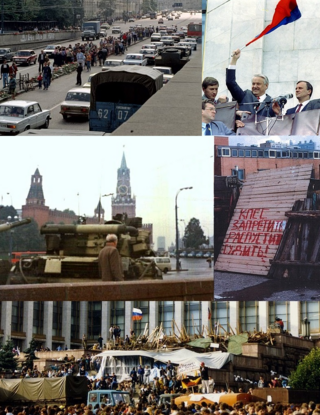
Back محاولة انقلاب 1991 في الاتحاد السوفيتي Arabic Intentu de golpe d'Estáu na Xunión Soviética AST Avqust qiyamı (SSRİ) Azerbaijani Жнівеньскі путч Byelorussian Жнівеньскі путч BE-X-OLD Августовски пуч в СССР (1991) Bulgarian Taol-stad c'hwitet e Moskov Breton Cop d'estat a la Unió Soviètica de 1991 Catalan Srpnový puč Czech Август пăтăрмахĕ CV
You can help expand this article with text translated from the corresponding article in Russian. (August 2022) Click [show] for important translation instructions.
|
| Part of a series on the |
| History of the Soviet Union |
|---|
 |
|
|
The 1991 Soviet coup attempt, also known as the August Coup,[b] was a failed attempt by hardliners of the Communist Party of the Soviet Union (CPSU) to forcibly seize control of the country from Mikhail Gorbachev, who was Soviet President and General Secretary of the CPSU at the time. The coup leaders consisted of top military and civilian officials, including Vice President Gennady Yanayev, who together formed the State Committee on the State of Emergency (GKChP). They opposed Gorbachev's reform program, were angry at the loss of control over Eastern European states and fearful of the New Union Treaty, which was on the verge of being signed by the Soviet Union (USSR). The treaty was to decentralize much of the central Soviet government's power and distribute it among its fifteen republics; Yeltsin's demand for more autonomy to the republics opened a window for the plotters to organize the coup.
The GKChP hardliners dispatched KGB agents who detained Gorbachev at his dacha but failed to detain the recently elected president of a newly reconstituted Russia, Boris Yeltsin, who had been both an ally and critic of Gorbachev. The GKChP was poorly organized and met with effective resistance by both Yeltsin and a civilian campaign of anti-authoritarian protesters, mainly in Moscow.[13] The coup collapsed in two days, and Gorbachev returned to office while the plotters all lost their posts. Yeltsin subsequently became the dominant leader and Gorbachev lost much of his influence. The failed coup led to both the immediate collapse of the CPSU and the dissolution of the USSR four months later.
Following the capitulation of the GKChP, popularly referred to as the "Gang of Eight", both the Supreme Court of the Russian Soviet Federative Socialist Republic (RSFSR) and President Gorbachev described its actions as a coup attempt.
- ^ a b Ольга Васильева, «Республики во время путча» в сб.статей: «Путч. Хроника тревожных дней». // Издательство «Прогресс», 1991. (in Russian). Accessed 14 June 2009. Archived 17 June 2009.
- ^ Dunlop, John B. (1995). The rise of Russia and the fall of the Soviet empire (1st pbk. printing, with new postscript ed.). Princeton, N.J.: Princeton University Press. ISBN 978-1-4008-2100-6. OCLC 761105926. Archived from the original on 4 December 2021. Retrieved 23 May 2021.
- ^ "Solving Transnistria: Any Optimists Left? by Cristian Urse. p. 58" (PDF). Archived from the original (PDF) on 8 September 2020.
- ^ A party led by the politician Vladimir Zhirinovsky – Accessed 13 September 2009. Archived 16 September 2009
- ^ Hayward, Alker; Rupesinghe, Kumar; Gurr, Ted Robert (1999). Journeys Through Conflict. Rowman & Littlefield. p. 119. ISBN 9780742510289.
- ^ a b "Би-би-си – Россия – Хроника путча. Часть II". news.bbc.co.uk. 18 August 2006. Archived from the original on 28 August 2007. Retrieved 14 August 2013.
- ^ Р. Г. Апресян. Народное сопротивление августовскому путчу (recuperato il 27 novembre 2010 tramite Internet Archive)
- ^ a b Cite error: The named reference
SovietCoup_Intlwas invoked but never defined (see the help page). - ^ "Апресян Р.Г. Народное сопротивление августовскому путчу". Archived from the original on 11 September 2007. Retrieved 4 December 2021.
- ^ Cite error: The named reference
Guptawas invoked but never defined (see the help page). - ^ "Third Soviet official commits suicide". United Press International. 26 August 1991. Archived from the original on 8 March 2019. Retrieved 7 March 2019.
- ^ "The Central Committee Chief of Administration Kills Himself". Deseret News. Archived from the original on 8 March 2019. Retrieved 7 March 2019.
- ^ Mark Kramer, "The Dialectics of Empire: Soviet Leaders and the Challenge of Civil Resistance in East-Central Europe, 1968–91", in Adam Roberts and Timothy Garton Ash (eds.), Civil Resistance and Power Politics: The Experience of Non-violent Action from Gandhi to the Present, Oxford University Press, 2009 pp. 108–109 Archived 20 March 2017 at the Wayback Machine.
Cite error: There are <ref group=lower-alpha> tags or {{efn}} templates on this page, but the references will not show without a {{reflist|group=lower-alpha}} template or {{notelist}} template (see the help page).
